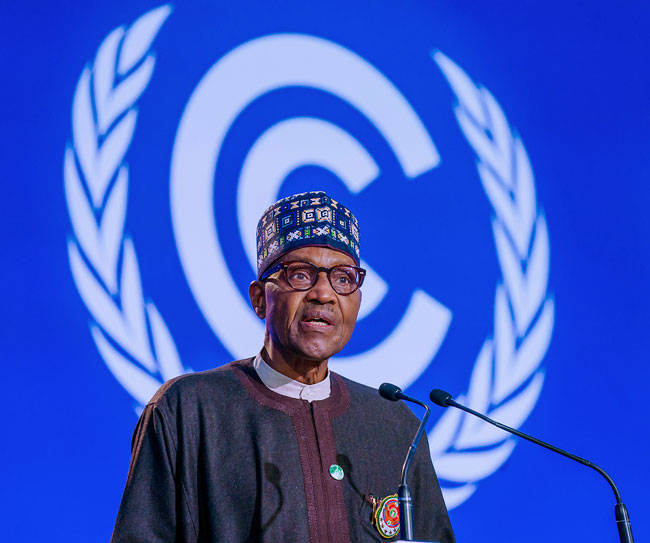The 2021 United Nations Climate Change Conference which ends today in Glasgow, the United Kingdom, drew a variety of participants ranging from heads of state, scientists, human and environmental rights activists and other stakeholders in global environmental protection.
The conference is the 26th Conference of the Parties (COP) to the United Nations Framework Convention on Climate Change, hence the acronym “COP 26”.
The theme of the conference, which focuses on science and innovation, aims to deploy scientific research and findings to resolve the major challenges that come with climate change and the resultant global warming which poses a danger to lives and livelihoods globally.
President Muhammadu Buhari, who delivered his address at the Leaders’ Summit of the conference, pledged that with the gas-based energy transition plan now in the works, Nigeria will hopefully reach net zero emission by 2060 as the country’s contribution to the global effort at tackling the challenges of global warming.
While addressing the audience, President Buhari aptly stated “I do not think anyone in Nigeria needs persuading of the need for urgent action on the environment. Desertification in the North, floods in the centre, pollution and erosion on the coast are enough evidence. For Nigeria, climate change is not about the perils of tomorrow but what is happening today. Nigeria is committed to net zero by 2060”.
President Buhari’s panacea for achieving this goal through gas-based energy transition looks good enough on the surface. Gas, which Nigeria has in abundance, is recommended by energy experts as a comparatively clean energy source.
But the reality is that Nigeria’s huge gas reserves remain largely untapped mainly because of the lack of financial and technical investment necessary to harness them. In this regard, it is ironic that while President Buhari was making this pledge in Glasgow, the price of cooking gas which is what many households and commercial establishments use as an energy source has continued to rise exponentially in Nigeria, due to a lack of the technical facilities to bring the commodity to the consumer. Indeed, this has resulted in many households now resorting to the use of wood and charcoal, adding to the very environmental challenges of deforestation and desertification that the president referred to at the conference.
As charity, they say, begins at home, we must first show commitment towards being able to tackle the challenges by ourselves before others can help.
Although the president talked about a gas transition master plan which seeks to address these issues comprehensively, the problem as always has to do with diligent implementation. Our fear, which is not far-fetched, stems from the fact that as this administration is due to exit in just under a couple of years, another administration may not implement the plan with the same zeal. There is need, therefore, for the President Buhari administration to constructively set the major pillars of the plan in such a way as to ensure continuity in implementation.
Similarly, the president’s call on developed countries to redeem their pledges in providing at least 100 million dollars annually in financial and technical assistance to developing countries in order to meet their goals at tackling environmental challenges needs to be critically assessed. While we do not fault the president’s call, our concern is that the request seems beggarly and reinforces the stereotype that African countries all too often do not seem to have their own initiative in tackling their own challenges.
The COP 26 was an opportunity once again for African countries to collectively push their case strongly for a fair deal in tackling the environmental challenges they face before a global gathering to tackle such issues constructively and comprehensively. But the unity of purpose was lacking. This much was sadly evident in the lack of a joint position and declaration by African countries on their unique environmental challenges through the African Union and other regional African bodies at the Glasgow conference. African countries need to do more in the area of climate change and they must appear to be serious about addressing the issue.

 Join Daily Trust WhatsApp Community For Quick Access To News and Happenings Around You.
Join Daily Trust WhatsApp Community For Quick Access To News and Happenings Around You.


